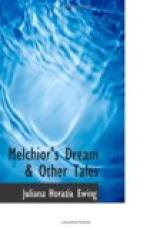The bumble-bee had just been caught (for the twenty-first time) with a loud smack on brother Benjamin’s ear, when the door opened, and Paterfamilias entered with Materfamilias (whose headache was better), and followed by the candles. A fresh log was then thrown upon the fire, the yule cakes and furmety were put upon the table, and everybody drew round to supper; and Paterfamilias announced that although he could not give the materials to play with, he had no objection now to a bowl of moderate punch for all, and that Richard might compound it. This was delightful; and as he sat by his father, ladling away to the rest, Adolphus Brown could hardly have felt more jovial, even with the champagne and ices.
The rest sat with radiant faces and shining heads in goodly order; and at the bottom of the table, by Materfamilias, was the friend, as happy in his unselfish sympathy as if his twenty-five sticks had come to life, and were supping with him. As happy—nearly—as if a certain woman’s grave had never been dug under the southern sun that could not save her, and as if the children gathered round him were those of whose faces he had often dreamt, but might never see.
His health had been drunk, and everybody else’s too, when, just as supper was coming to a close, Richard (who had been sitting in thoughtful silence for some minutes) got up with sudden resolution, and said,
“I want to propose Mr. What’s-his-name’s health on my own account. I want to thank him for his story, which had only one mistake in it. Melchior should have kept the effervescing papers to put into the beer; it’s a splendid drink! Otherwise it was first-rate; though it hit me rather hard. I want to say that though I didn’t mean all I said about being an only son (when a fellow gets put out he doesn’t know what he means), yet I know I was quite wrong, and the story is quite right. I want particularly to say that I’m very glad there are so many of us, for the more, you know, the merrier. I wouldn’t change father or mother, brothers or sisters, with any one in the world. It couldn’t be better, we couldn’t be happier. We are all together, and to-morrow is Christmas Day. Thank GOD.”
It was very well said. It was a very good speech. It was very well and very good that while the blessings were with him, he could feel it to be so, and be grateful.
It was very well, and good also, that the friend, who had neither home nor kindred to be grateful for, had something else for which he could thank GOD as heartily. The thought of that something came to him then as he sat at his friend’s table, filling his eyes with tears. It came to him next day as he knelt before GOD’s altar, remembering in blessed fellowship that deed of love which is the foundation of all our hope and joy. It came to him when he went back to his lonely wandering life, and thought with tender interest of that boyish speech. It came—a whisper of consolation to silence envy and regret for ever.




